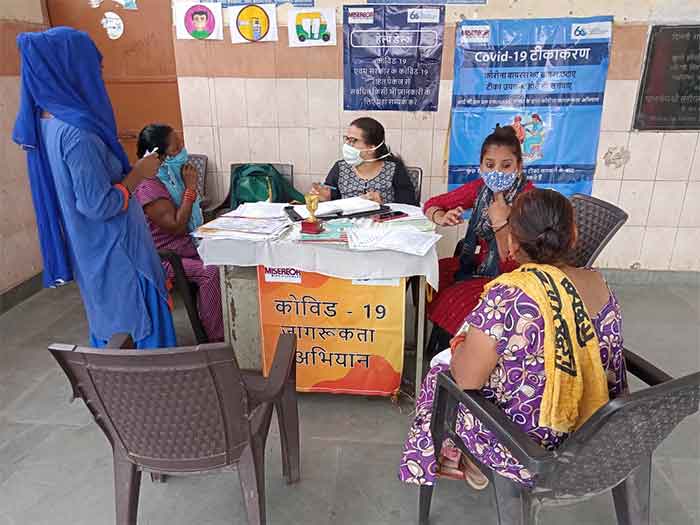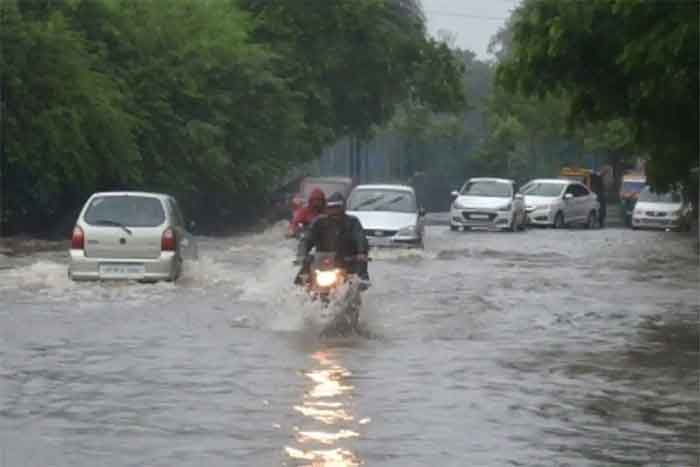
Bhopal: “I don’t want to take the vaccine as I have read on social media that I will not be able to bear a child,” said Rekha (name changed on request).
The 22 year old, is a resident of Bhopal, the state capital of Madhya Pradesh, who fears that she will have grave side effects after vaccination that will render her infertile, and as a result cause problems in finding a groom for her.
Such myths and fears have been found to increase vaccine hesitancy among women of the state who think that vaccination will disrupt their reproductive cycle, cause them to have heavier periods or make them sick for a long period of time. The fear of falling sick and dying is also a major cause of vaccine hesitancy among women in many districts of the state.
“I was told that I will die if I take the vaccine, so I did not get the shot,” said Rajni Raman, 32, of Bagmugalia, Bhopal. She works as a house-help and despite the encouragement by her employers, is still scared of getting the vaccine.
“The lady I work for has been after me to get vaccinated but I do not want to. If I die, who is going to look after my kids?,” she asked.
 Around 2,55,50,643 people had been vaccinated in the state by 15:30 hours on July 19. Out of them 55% were men. The difference between vaccinated men and women was around 26,69,155. This disparity has been caused due to the propagation of myths and lack of proper counselling, even at the vaccination centres. Nationwide, around 40, 65,86,951 people received the vaccine, out of which 53.4% were men and 46.5% were women, creating a difference of almost 2.8 crore, as per the COWIN portal.
Around 2,55,50,643 people had been vaccinated in the state by 15:30 hours on July 19. Out of them 55% were men. The difference between vaccinated men and women was around 26,69,155. This disparity has been caused due to the propagation of myths and lack of proper counselling, even at the vaccination centres. Nationwide, around 40, 65,86,951 people received the vaccine, out of which 53.4% were men and 46.5% were women, creating a difference of almost 2.8 crore, as per the COWIN portal.
Such myths are more prevalent among those who get their information from forwarded messages on social media and by word of mouth.
“A lot of myths and conspiracy theories have come up after vaccination began in India and spread fear among the people” said Prarthna Mishra, director of Sangini Gender Resource Centre in the state capital.
Pointing to the root of the problem, Mishra said that while fake news reaches people very fast, myth busting and counselling lag behind, thus increasing the incidents of vaccine hesitancy and fear mongering by forwarded texts on messaging apps and the internet.
“There is hardly any guidance or counselling for women. Even at the vaccination centres, there is just a nurse and one or two helpers. Even if the nurses at the vaccination centres have the information, they obviously do not have the time to provide counselling to them because of the large number of people coming in,” she told Covid Response Watch.
Dr Rashmi Dwivedi, Professor and HOD of the Pediatric Department at L N Medical College says that it is also because of ‘husband dependency’ that women are not getting vaccinated. “Not only rural, but a huge percentage of urban women also rely on their husbands or other male members to drive them to places, and the same is happening with vaccination. If the male members, especially husbands, do not have time, the women are left behind, even if they want to get vaccinated. This procrastination is also a major cause for the shortage in numbers of females getting vaccinated.”
She added that Federation of Obstetric & Gynecological Societies of India (FOGSY) has released several guidelines and done a lot of myth busting among women. Women can take vaccines even during periods, if they are suffering from any diseases like diabetes, blood pressure and PCOD. The association has also declared that pregnant women can take the vaccine after the first trimester, and this advice is also precautionary.
Lack of availability of vaccines and information about vaccination centres in their areas is adding to the woes of the women.
“I was very scared of getting the vaccine as I had read on my phone that people are dying after vaccination more than due to Covid-19. Now that I have seen a lot of women who had no problems after vaccination, except some mild fever, many vaccination centres are not providing the first shot. Now I have to wait for the centres to restart the first dose,” said 42-year old Asha Malviya, of Bhopal.
Some women domestic workers have recounted incidents where they went to get the vaccine in a walk-in centre, in the afternoon, but the centre close to their place had run out of vaccines.
Social worker and women’s rights activist, Manjiri Chande, of Pararth NGO of Chhindwara who has been very actively busting myths in her district says that daily wage workers and domestic help also fear losing on their day’s wage if they fall sick.
“They are very poor and some women are the sole breadwinners of their families. They cannot afford to fall ill and miss work, so they are reluctant to get the vaccine,” she said.
Dr Neelkamal Kapoor, professor and Head of Pathology Department, AIIMS, Bhopal says that while women are gradually coming forward for the vaccination, conservative culture, especially among rural women, prevents the dissemination of the correct information.
Talking to CRW, she said, “Rural women are hesitant in discussing their doubts and problems with male doctors, and they talk through the men of their families, like husbands, brothers and fathers. So many times, the information they receive indirectly is distorted, and sometimes it does not reach them at all.”
“Reluctance to wait in long queues with men is also an issue among rural women. They feel self-conscious when waiting in lines at the vaccination centres with men in majority,” added Hemal Kamat, director and secretary of Concept Society, an organization working for holistic development and health related issues with their focus on women in Indore.
Creating awareness and busting myths through proper guidance and counselling, many social activists and NGOs, across the state are going on field visits to help women overcome their fears and get the shot.
“Some women of the Korku tribe, were very scared for their lives and had resolved not to take the vaccine. But with the help of local doctors, gynaecologists and educated members of the organization, we conducted online counselling sessions and answered their questions. All they needed were answers to their questions” said Seema Prakash, secretary of Spandan Samaj Seva Samiti of Khandwa.
Prakash’s organisation and others have helped lower the gap between the vaccinated men and women in Khandwa by spreading awareness and busting myths. The difference between the vaccinated men and women in Khandwa is now just 27,157, one of the lowest in the state.
Similar efforts are underway in other parts of MP also through online sessions and training programmes for women to educate them about the benefits of the vaccine.
“Our members go out to help people find vaccination centres, clear their doubts telling them about positive effects of the vaccine, and how it will reduce their risk of getting infected by COVID-19 and also decrease their chances of dying from it,” Mishra added.
She added, “We have come a long way from where we started, but a lot more needs to be done.”
Shuchita Jha is a Bhopal-based freelance journalist













































